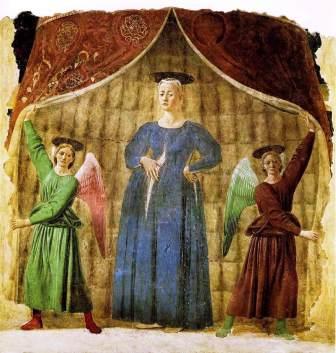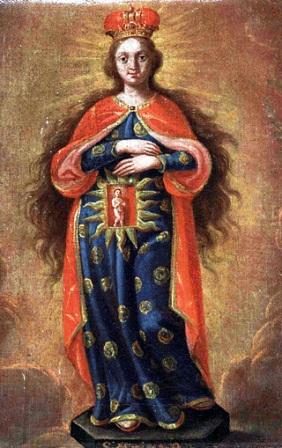 Over at the excellent Lion & Cardinal there is an entry about today’s traditional observance of the Expectation of the Blessed Virgin.
Over at the excellent Lion & Cardinal there is an entry about today’s traditional observance of the Expectation of the Blessed Virgin.
My emphases and comments:
Dom Prosper Gueranger:
This feast, which is now kept not only throughout the whole of Spain but in many other parts of the Catholic world, owes its origin to the bishops of the tenth Council of Toledo, in 656. These prelates thought that there was an incongruity in the ancient practice of celebrating the feast of the Annunciation on the twenty-fifth of March, inasmuch as this joyful solemnity frequently occurs at the time when the Church is intent upon the Passion of our Lord, so that it is sometimes obliged to be transferred into Easter time, with which it is out of harmony for another reason; they therefore decreed that, henceforth, in the Church of Spain there should be kept, eight days before Christmas, a solemn feast with an octave, in honour of the Annunciation, and as a preparation for the great solemnity of our Lord’s Nativity.
In course of time, however, the Church of Spain saw the necessity of returning to the practice of the Church of Rome, and of those of the whole world, which solemnize the twenty-fifth of March as the day of our Lady’s Annunciation and the Incarnation of the Son of God. But such had been, for ages, the devotion of the people for the feast of the eighteenth of December, that it was considered requisite to maintain some vestige of it. They discontinued, therefore, to celebrate the Annunciation on this day; but the faithful were requested to consider, with devotion, what must have been the sentiments of the holy Mother of God during the days immediately preceding her giving Him birth. A new feast was instituted, under the name of the Expectation of the blessed Virgin’s delivery.
This feast, which sometimes goes under the name of Our Lady of O, or the feast of O, on account of the [antiphon] which begins O Virgo virginum [and because on that day the clerics in the choir after Vespers used to utter a loud and protracted O, to express the longing of the universe for the coming of the Redeemer], [Come to think of it, I have probably done that too, from time to time…. usually in the face of liturgical abuses or a particularly stupid sermon. But I digress…] is kept with great devotion in Spain. A High Mass is sung at a very early hour each morning during the octave, at which all who are with child, whether rich or poor, consider it a duty to assist, that they may thus honour our Lady’s Maternity, and beg her blessing upon themselves… [NICE!]
Most just indeed it is, O holy Mother of God, that we should unite in that ardent desire thou hadst to see Him, who had been concealed for nine months in thy chaste womb; to know the features of this Son of the heavenly Father, who is also thine; to come to that blissful hour of His birth, which will give glory to God in the highest, and, on earth, peace to men of good-will. Yes, dear Mother, the time is fast approaching, though not fast enough to satisfy thy desires and ours. Make us redouble our attention to the great mystery; complete our preparation by thy powerful prayers for us, that when the solemn hour has come, our Jesus may find no obstacle to His entrance into our hearts.
O Virgo virginum, quomodo fiet istud? quia noc primam similem visa es, nec habere sequentem. Filae Jerusalem, quid me admiramini? Divinum est mysterium hoc quod cernitis.O Virgin of virgins! how shall this be? for never was there one like thee, nor will there ever be. Ye daughters of Jerusalem, why look ye wondering at me? What ye behold, is a divine mystery.
[The Liturgical Year]
So! Blue vestments in Spain and some groaning too!
We have a rich and interesting Church!
I like that idea of having a time for blessings of women who are with child.

 This feast, which sometimes goes under the name of Our Lady of O
This feast, which sometimes goes under the name of Our Lady of O
































O Virgo Virginum O Virgin of virgins! how shall this be? for never was there one like thee, nor will there ever be. Ye daughters of Jerusalem, why look ye wondering at me? What ye behold, is a divine mystery.
I see in my “Anglican Breviary” that this (dating back to Catholic Sarum usage) is the 8th Great O Antiphon (of December 23); to accomodate eight O antiphons (rather than just the 7 of current Roman Catholic usage) before Christmas Eve, traditional Anglicans begin Sapientiatide (with O Sapientia) on December 16 (rather than our December 17).
“I like that idea of having a time for blessings of women who are with child.”
We do a blessing of the mothers every year on the 2nd of February (or the first sunday of february) at st. Anthony Basilica (Padua Italy), at the very end of that “tail” of Christmas celebrations, when we recall the blessed Virgin coming to the Temple with her baby son to offer him in thanksgiving to God the Father.
The Church is usually full of mothers with newborn children, mothers about to deliver, and many mothers to be, asking the grace of a child. It is a sweet, moving, and solemn blessing, full of thankfulness for some and hope for others. And don’t forget, by the way, that the Basilica of St Anthony is indeed entitled to the Blessed Virgin Mother of God, not to the patron saint who dwells in it!
Question: does the Church still follow the old custom of “the Churching of Women” – which was still in the Anglican prayer book when we left?
I wonder if that is the origin of the spanish surname, de la O. It is an old Spanish name and not very common but I always wondered where it came from.